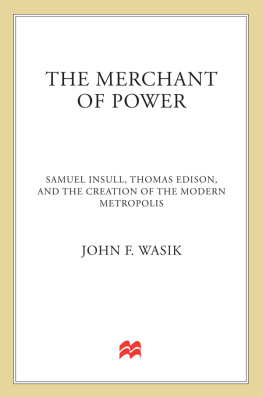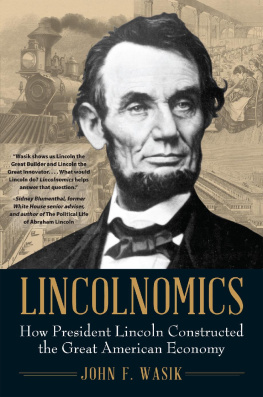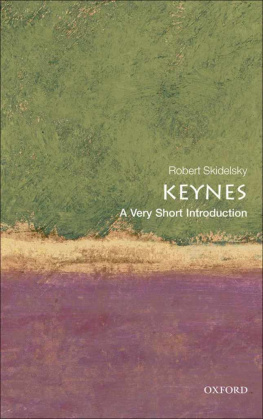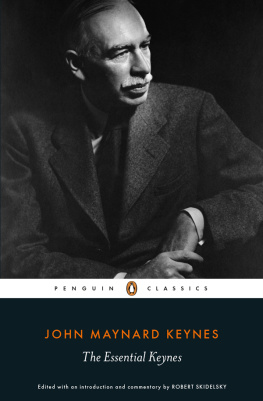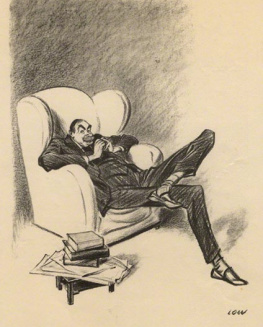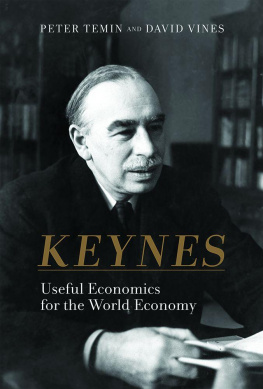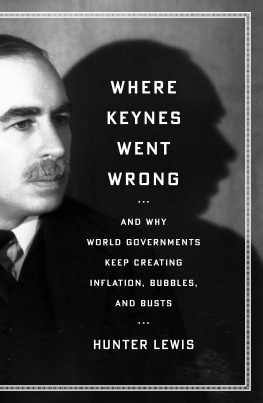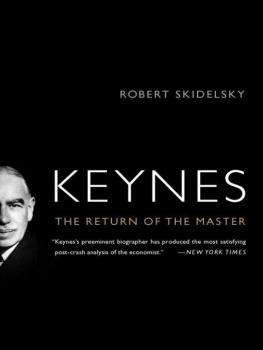John F. Wasik - Keyness Way to Wealth: Timeless Investment Lessons from The Great Economist
Here you can read online John F. Wasik - Keyness Way to Wealth: Timeless Investment Lessons from The Great Economist full text of the book (entire story) in english for free. Download pdf and epub, get meaning, cover and reviews about this ebook. year: 2013, publisher: McGraw-Hill, genre: Romance novel. Description of the work, (preface) as well as reviews are available. Best literature library LitArk.com created for fans of good reading and offers a wide selection of genres:
Romance novel
Science fiction
Adventure
Detective
Science
History
Home and family
Prose
Art
Politics
Computer
Non-fiction
Religion
Business
Children
Humor
Choose a favorite category and find really read worthwhile books. Enjoy immersion in the world of imagination, feel the emotions of the characters or learn something new for yourself, make an fascinating discovery.

- Book:Keyness Way to Wealth: Timeless Investment Lessons from The Great Economist
- Author:
- Publisher:McGraw-Hill
- Genre:
- Year:2013
- Rating:5 / 5
- Favourites:Add to favourites
- Your mark:
Keyness Way to Wealth: Timeless Investment Lessons from The Great Economist: summary, description and annotation
We offer to read an annotation, description, summary or preface (depends on what the author of the book "Keyness Way to Wealth: Timeless Investment Lessons from The Great Economist" wrote himself). If you haven't found the necessary information about the book — write in the comments, we will try to find it.
Mr. Wasiks distillation of how Keynes made--and then remade--his fortune is instructive. And the principles that Keynes followed have stood the test of time. As Mr. Wasik adds, The object of investing is to ensure prosperity, not to become obsessed with making money.
The New York Times
John Maynard Keynes indelibly made his mark on global economics...
Few people know, however, that he was also a daring, steel-nerved investor who built a multimilliondollar fortune in the stock market while providing financial counsel to the likes of Winston Churchill and FDR. Now, you can learn from--and imitate--Keyness success by examining the story of his lifeand investment strategies, masterfully told by awardwinning author John F. Wasik.
As you follow Keynes from his early years with the Bloomsbury Group, through two world wars and the Great Depression Keyness theories and practices come to life by way of the historic and personal events that shaped them. Like todays investors, Keynes faced markets roiled by panic, inflation, deflation, widespread unemployment, and war--and he developed a core set of principles to prosper in every climate. With the individual investor in mind, this straightforward guide makes it easy for investors at all levels to implement the action-oriented strategies presented in each of the 10 chapters and start investing like Keynes today by:
- Buying and holding quality stocks
- Ignoring short-term news
- Building diversified portfolios
- Trading contrary to market momentum
- Getting the most out of dividend stocks
Using the eloquent insight of a seasoned investment writer, author John F. Wasik digs down into what investments Keynes owned, how he bought and sold them, how his theories guided his investments, and vice versa. He illustrates why Keyness ideas, insights, and portfolio strategies have withstood the test of time, and how they will continue to produce financial gains for dedicated investors. In a nutshell, Wasik delivers a pragmatic guide to the style of portfolio management practiced by such Keynes followers as Benjamin Graham, Warren Buffett, and Charles Munger.
The smart money gets richer in all types of weather, and so can you by following Keyness Way to Wealth.
PRAISE FOR KEYNESS WAY TO WEALTH:
Intelligent investing ultimately depends on having an intelligent theory of the economy. This story of Keyness life as an investor illustrates this beautifully. -- Robert Shiller, professor of Economics, Yale University; New York Times columnist; and author of Finance and the Good Society
The great economist John Maynard Keynes speculated and lost big-time. Out of the ashes, he evolved some great long-term investment strategies that will work for every prudent investor. While picking up tips, youll also find that this book is a great read. -- Jane Bryant Quinn, author of Making the Most of Your Money NOW
Id always heard Keynes was a talented investor but never knew any of the details. John Wasiks excellent book uncovers that story and reveals Keyness considerable investing skills. If you enjoy studying great investors, add this book to your list. -- Joe Mansueto, founder and CEO, Morningstar, Inc.
With the possible exception of Mark Twain, no one surpasses John Maynard Keynes as a source of pithy financial wisdom and sayings. Keyness Way to Wealth mines the reasoning and investment experiences behind his quotability, a bounty that will simultaneously edify, entertain, and augment your bottom line. -- William J. Bernstein, author and principal, Efficient Frontier Advisors
John F. Wasik: author's other books
Who wrote Keyness Way to Wealth: Timeless Investment Lessons from The Great Economist? Find out the surname, the name of the author of the book and a list of all author's works by series.

